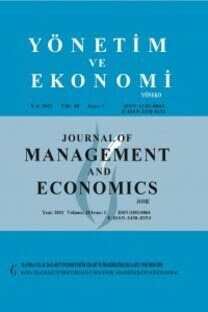Ruhsal Zeka ve Çalışma Algısı Üzerine Bir Analiz
Zeka, Ruhsal Zeka, Çalışma Algısı, İş Görme Anlayışı, İnsan Kaynakları Yönetimi
The Analysis on Spiritual Intelligence and Working Perception
Intelligence, Spiritual Intelligence, Working Perception, Work Mentality, Human Resources Management,
___
- Akgemci, T., ve Bekiş, T. (2013, Ekim). Liderlikte Ruhsal Zeka Üzerine Bir Alan Araştırması. Selçuk Üniversitesi İktisadi ve İdari Bilimler Fakültesi Sosyal ve Ekonomik Araştırmalar Dergi(26), 283-300. http://sead.selcuk.edu.tr/sead/article/download/167/166
- Aldemir, C., Arbak, Y., ve Özmen, Ö. (2003). Türkiye’de İşgörme Anlayışı: Tanımı Ve Boyutları. Yönetim Araştırmaları Dergisi, 3(1), 5-28. http://www.yad.baskent.edu.tr/makale.htm#MAKALELER
- Amram, Y. (2007, August). The Seven Dimensions of Spiritual Intelligence: An Ecumenical, Grounded Theory. Association, Paper Presented at The 115th Annual Conference of The American Psychological. San Francisco, CA. http://www.yosiamram.net/docs/7_Dimensions_of_SI_APA_confr_paper_Yosi_Amram.pdf
- Aydıntan, B. (2009). Ruhsal Zekânın Dönüştürücü Liderlik Üzerine Etkisini Araştıran Uygulamalı Bir Çalışma. Atatürk Üniversitesi İktisadi ve İdari Bilimler Dergisi, 23(2), 257-274. http://e-dergi.atauni.edu.tr/atauniiibd/article/viewFile/1025003840/1025003668
- Baloğlu, N., ve Karadağ, E. (2009). Ruhsal Liderlik Üzerine Teorik Bir Çözümleme. Kuram ve Uygulamada Egitim Yönetimi, 15(58), 165-190. http://dergipark.ulakbim.gov.tr/kuey/article/viewFile/5000050594/5000047842
- Başar, E. (2013). Translational Research: Brain Oscillations In Neuropsychiatric Disease. Dialogues in Clinical Neuroscience, 15(3), 291-300. http://www.dialogues-cns.com/publication/brain-oscillations-in-neuropsychiatric-disease/
- Bennis, W. (2001). Bir Lider Olabilmek, Çev: Utku Teksöz. İstanbul: Sistem Yayıncılık
- Bozkurt, V. (2000). Püritanizmden Hedonizme Yeni Çalışma Etiği (1. b.). Bursa: Alesta
- Celal, M. (2007, Temmuz 19). Ebru: Kültürel Çeşitlilik Üzerine Yansımalar. Cumhuriyet Kitap Eki. http://www.metiskitap.com/catalog/text/68888
- Chaudhary, B., ve Aswal, M. (2013, October 7). Imparting Spiritual Intelligence Curriculum In Our Classrooms. European Academic Research, 1(7), 1508-1515. http://euacademic.org/UploadArticle/112.pdf
- Çat, S. (2014). Acil Yardım, Kurtarma Ve Müdahale Çalışanlarının Ruhsal Zeka Ve Tükenmişlik Düzeylerinin Belirlenmesi Üzerine Bir Çalışma: Gümüşhane İli Örneği . (Yayınlanmamış Yüksek Lisans Tezi). Gümüşhane Üniversitesi/Sosyal Bilimler Enstitüsü, Gümüşhane
- Covey, S. (2004), The 8th Habit: From Effectiveness to greatness. Free Press
- Damasio, A. (1994). Descartes' Error : Emotion, Reason, And The Human Brain. London: Penguin
- Damasio, A. R. (2000). The Feeling of What Happens: Body and Evolution in the Making of Consciousness. (1. b.). New York: Harvest
- Emmons, R. A. (2000). Is spirituality an intelligence? Motivation, Cognition, and the Psychology of Ultimate Concern. The International Journal for the Psychology of Religion(10), 3-26. Doi:10.1207/S15327582IJPR1001_2
- Field, A. (2013). Discovering Statistics Using IBM SPSS Statistics (4. b.). London: Sage.
- Forghania, A. K., Dehkordib, A. M., Mobarakic, M. H., ve Toulid, M. N. (2014). Studying the Effects of Employee’s Spiritual Intelligence on Work Engagement in Ferdowsi University of Mashhad. Asian Journal of Research in Business Economics, 4(8), 292-304. http://www.indianjournals.com/ijor.aspx?target=ijor:ajrbem&volume=4&issue=8&article=026
- Gardner, H. (2012, Haziran). The Theory of Multiple Intelligences. http://www.pz.harvard.edu/sites/default/files/Theory%20of%20MI.pdf
- Jensen, E. (1998). Teaching With The Brain Iin Mind (2. b.). Virginia, USA: Association for Supervision and Curriculum Development Alexandria.
- Keleş, E., ve Çepni, S. (2006). Beyin Ve Öğrenme Yıl 3, Sayı 2, Aralık 2006. Türk Fen Eğitimi Dergisi, 3(2), 66-82. http://egitimarastirmasi.ueuo.com/ogrenme/2006aralik.pdf
- Kesken, J., ve Ayyıldız, N. A. (2008). Liderlik Yaklaşımlarında Yeni Perspektifler: Pozitif Ve Otantik Liderlik. Ege Akademik Bakış, 8(2), 729-754. https://www.academia.edu/6423052/L%C4%B0DERL%C4%B0K_YAKLA%C5%9EIMLARINDA_YEN%C4%B0_PERSPEKT%C4%B0FLER
- King, D. B. (2008). Rethinking Claims Of Spirıtual Intelligence:A Definition, Model, And Measure. (Unpublished Master's Thesis). Trent Unıversıty, Canada.
- Köse, S., Oral, L., ve Tetik, H. T. (2014). Y Kuşağının Birinci Ve İkinci Yarısında İş Değerlerinin Karşılaştırılması Üzerine Bir Araştırma. HUMANITAS Uluslararası Sosyal Bilimler Dergisi, Uluslararası Hakemli Dergi(3), 149-165. http://humanitas.nku.edu.tr/article/viewFile/5000107778/5000100511
- Levy, R. B. (2000). My Experience as Participant in The Course of Spirituality for Executive Leadership. Journal of Management Inquiry, 9(2), 129-131. http://jmi.sagepub.com/content/9/2/129.full.pdf+html
- Moxley, R. S. (2000). Leadership and Spirit. San Francisco,CA: Jossey-Bass.
- Nasel, D. D. (2004). Spiritual Orientation in Relation to Spiritual Intelligence: A Consideration of Traditional Christianity and New Age/Individualistic Spirituality. (Unpublished Doctoral Dissertation). University of South Australia.
- Özdemir, S., ve Yiğit Seyfi, Ü. (2015). A Transformation From the Cages of Spirits to the Spiritual Organizations: Different Solutions to Employee Oriented Issues. The 2015 WEI International Academic Conference Proceedings (s. 230-234). Harvard, USA: The West East Institute. http://www.westeastinstitute.com/wp-content/uploads/2015/07/Selim-TX.pdf
- Pallant, J. (2010). SPSS Survial Manuel (4. b.). New York, USA: McGraw-Hill Open
- Singer, W. (1999, February ). Striving for Coherence. Nature, 397, 391-393. http://cognitrn.psych.indiana.edu/busey/erp/Singer_Nature.pdf
- Tarhan, N. (2013). Duyguların Psikolojisi (13. b.). İstanbul: Timaş.
- ISSN: 1302-0064
- Başlangıç: 1995
- Yayıncı: Manisa Celal Bayar Üniversitesi
Vergi Uyumunu Belirleyen Faktörlere Genel Bir Bakış
Volkan YURDADOĞ, Ramazan GÖKBUNAR, Barış TUNÇAY
Yeni Turistik Eğilimler: Antalya İli Örneği
Para Politikasının Kredi Faiz Oranlarına Geçişkenliği Üzerine Dinamik Bir Analiz: Türkiye Örneği
Nilgün ÇAĞLARIRMAK USLU, Pınar KARAHAN
Şakir SAKARYA, Zeliha SÜNBÜL KOÇAK
Öğrencilerin Kariyer Planlamalarında Girişimcilik, Profesyonellik ve Liderlik Arzularının Ölçülmesi
Metin ÖNER, Meltem ONAY, İpek DEVECİ KOCAKOÇ
Ruhsal Zeka ve Çalışma Algısı Üzerine Bir Analiz
Ümmühan YİĞİT SEYFİ, Sevinç KÖSE
Bir Tekstil Firmasında Bulanık TOPSIS Yöntemiyle Tedarikçi Seçimi
Yapısal Kırılmalar Altında Kamu-Özel Kesim Yatırım Harcamaları İlişkisi
Mükelleflerin Yerel Vergi Algıları Üzerine Bir Analiz: Bursa Örneği
